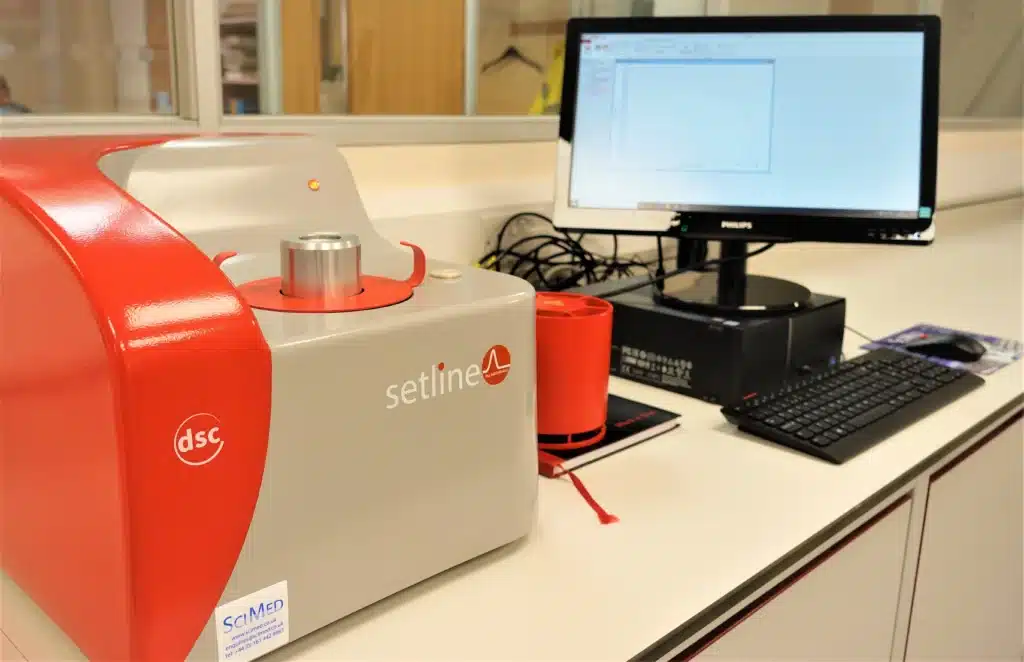Our laboratories generate reaction rate and thermal degradation test data on the thermal properties of materials.
-
Air Over Layer
-
Bulk Powder (Diffusion Cell)
-
Aerated Cell
-
Differential Scanning Calorimetry (DSC)
-
Advanced Reactive System Screening Tool (ARSST)
-
Accelerating Rate Calorimetry (ARC)
-
Carius Tube
We also offer a range of Chemical Reaction Hazard Testing and Analysis services.
The safe management, handling and elimination of the dangers posed by uncontrolled exothermic activity, runaway reactions and undesirable chemical reactions are of vital importance to the protection of your business, people, workplace and environment.
Sigma-HSE’s thermal stability testing lab offer comprehensive standard and custom testing packages to aid you in the identification of the oxidation, combustion or molecular decomposition of materials in your workplace.
Test the thermal properties of your hazardous materials
The Sigma-HSE Advantage
Request a Free Technical Consultation
Discover our range of thermal stability testing methods
AIR OVER LAYER
Test
The air over layer test is conducted to establish the onset temperature of exothermic activity on thin layers of materials when exposed to elevated atmospheric temperatures. It replicates thin layer (up to 15 mm) deposits in a drying situation i.e. drier walls or roofs where hot air may rush over the surface.
Using a small tray test cell, a sample is placed inside a cell and thermocouples are placed into the material at three locations. This assembly is then placed into a digitally controlled horizontal laboratory tube oven with a controlled heated air supply.
Either of the below tests can be performed using a data acquisition system to monitor, detect and record any exothermic activity.
Screening Test
An environmental temperature is digitally increased from ambient conditions up to 400°C at 0.5°C.min-1. This test configuration is used for estimating exothermic activity for onset temperature.
Isothermal Test
The loaded test cell is placed into a heated oven and set to a specified temperature for a duration of 24 hours. The temperature selected can be based on working or proposed process conditions, plus factors for safety. Alternatively, full determination can be undertaken, whereby several isothermal tests can be conducted to establish a definitive ignition temperature.
Benefit
Not only is the air over layer test a necessity in evaluating whether current or proposed drying and process temperatures are safe, but it can also confirm the possibility of using higher temperatures to increase productivity.
BULK POWDER (DIFFUSION CELL)
Test
The aerated bulk powder diffusion cell test is conducted to establish the onset temperature of the exothermic activity of a material when exposed to elevated atmospheric temperatures. It replicates small bulk deposits in any drying situation where heated air is percolated through a material i.e. fluid bed driers.
Using a cylindrical glass test cell with a sintered glass bottom, the sample is placed inside the cell. Thermocouples are then inserted through its wall into the material at four locations from the bottom upwards. A glass lid is applied, and a regulated hot air supply that pushes air through the test material is connected. The assembly is placed into a digitally controlled laboratory oven and either of the below tests are performed using a data acquisition system to monitor, detect and record any exothermic activity.
Screening Test
An environmental temperature is digitally increased from ambient conditions up to 400°C at 0.5°C.min-1. This test configuration is used for estimating exothermic activity for onset temperature.
Isothermal Test
The loaded test cell is placed into a heated oven and set to a specified temperature for a duration of 24 hours. The temperature selected can be based on working or proposed process conditions, plus factors for safety. Alternatively, full determination can be undertaken, whereby several isothermal tests can be conducted to establish a definitive ignition temperature.
Benefit
Not only is the aerated bulk powder diffusion cell test a necessity in evaluating whether current or proposed drying and process temperatures are safe, it can also confirm the possibility of using higher temperatures to increase productivity.
AERATED CELL
Test
The aerated bulk powder diffusion cell test is conducted to establish the onset temperature of the exothermic activity of a material when exposed to elevated atmospheric temperatures. It replicates small bulk deposits in any drying situation where heated air is percolated through a material i.e. fluid bed driers.
Using a cylindrical glass test cell with a sintered glass bottom, the sample is placed inside the cell. Thermocouples are then inserted through its wall into the material at four locations from the bottom upwards. A glass lid is applied, and a regulated hot air supply that pushes air through the test material is connected. The assembly is placed into a digitally controlled laboratory oven and either of the below tests are performed using a data acquisition system to monitor, detect and record any exothermic activity.
Screening Test
An environmental temperature is digitally increased from ambient conditions up to 400°C at 0.5°C.min-1. This test configuration is used for estimating exothermic activity for onset temperature.
Isothermal Test
The loaded test cell is placed into a heated oven and set to a specified temperature for a duration of 24 hours. The temperature selected can be based on working or proposed process conditions, plus factors for safety. Alternatively, full determination can be undertaken, whereby several isothermal tests can be conducted to establish a definitive ignition temperature.
Benefits
Not only is the aerated bulk powder diffusion cell test a necessity in evaluating whether current or proposed drying and process temperatures are safe, it can also confirm the possibility of using higher temperatures to increase productivity.
This screening approach can save the need to conduct further dust explosion dispersive testing to establish a suitable basis of safety for processing the substance.
* Ignition of a dust layer or bulk deposits through thermal decomposition may still present a risk and further dust testing should be considered. Discover more about our Air Over Layer, Bulk Powder (Diffusion Cell), Aerated Cell and LIT tests.
DIFFERENTIAL SCANNING CALORIMETRY (DSC)
ADVANCED REACTIVE SYSTEM SCREENING TOOL (ARSST)
Standards
Industry standard tool for screening reactive systems, developed to compliment DIERS
Test
The Advanced Reactive System Screening Tool (ARSST) is a pseudo-adiabatic calorimeter batch reactor tool that is used to quickly identify potential reactive chemical hazards in processes.
It consists of a well-instrumented pressure vessel that usually holds a spherical glass test cell that can heat a 10 ml sample at a specified ramp or rate, determining onset temperatures of up to 400 °C. The reaction mixture, magnetic stirrer and thermocouple are introduced to this cell, while the pressure inside the vessel is measured by a pressure transducer. Due to the unique heating method by a wraparound heater, the sample is kept in a pseudo-adiabatic mode and no heat loss to the surroundings occurs. Typical data outputs can include the following:
- Rate of pressure rise
- Heat of reaction
- Heat of mixing
- Total adiabatic temperature rise
- Onset temperature
- Tempering temperature
- Time to maximum rate (induction time profile)
Benefits
Flexible screening tool for analysis of varied Reactive Systems: basic reaction calorimetry possible with reagent mixing, thermal stability screening of mixtures and materials, and evolved pressure data to boot. Uses typically small sample sizes to compliment early-stage development.
Pseudo-adiabatic methodology for accurate determination of thermal decomposition onsets of materials, with the added benefit of pressure data collection.
ACCELERATING RATE CALORIMETRY (ARC)
Standards
Recognised industry standard test, developed first at ICI and astrazeneca hazard labs, and included in ABPI and IChemE publications on Chemical Reaction Hazard Assessment.
Test
The Carius tube apparatus is used as a small-scale screening tool for thermal stability. It is primarily undertaken to investigate exothermic activity and gas generation. The Carius tube can also aid in the detection of exothermic activities such as onset temperatures. It can also identify the pressure effects of permanent gas generation.
The Carius tube apparatus works by placing approximately 10 g of a test material in a heavy-walled sealed glass tube and then placing it in an oven. The oven temperature is then increased at a controlled rate (typically 0.5 °C/min). The temperature and pressure of the test cell are then detailed and recorded to assess the thermal stability of the sample upon heating.
Benefits
The Carius Tube test can quickly identify thermal regions of interest (exothermic events, structural changes, permanent gas generation), which can then in turn be investigated in more detail using adiabatic or more precise techniques. The Carius Tube is often run as a screening test complimentary to DSC, as it provides the valuable pressure data not available from the DSC.
CARIUS TUBE
Standards
Recognised industry standard test, developed first at ICI and astrazeneca hazard labs, and included in ABPI and IChemE publications on Chemical Reaction Hazard Assessment.
Test
The Carius tube apparatus is used as a small-scale screening tool for thermal stability. It is primarily undertaken to investigate exothermic activity and gas generation. The Carius tube can also aid in the detection of exothermic activities such as onset temperatures. It can also identify the pressure effects of permanent gas generation.
The Carius tube apparatus works by placing approximately 10 g of a test material in a heavy-walled sealed glass tube and then placing it in an oven. The oven temperature is then increased at a controlled rate (typically 0.5 °C/min). The temperature and pressure of the test cell are then detailed and recorded to assess the thermal stability of the sample upon heating.
Benefits
The Carius Tube test can quickly identify thermal regions of interest (exothermic events, structural changes, permanent gas generation), which can then in turn be investigated in more detail using adiabatic or more precise techniques. The Carius Tube is often run as a screening test complimentary to DSC, as it provides the valuable pressure data not available from the DSC.

